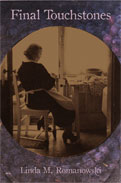
 |
Even before stories were written, they were passed along from generation to generation, standing the test of time. Story is central to Romanowski’s memoir, one that delves deep into her Italian roots, how they’ve intersected and fused with American life, and the indelible impact family has had on her own life—and she on theirs. Through prose and poetry, the author meticulously and gracefully guides readers through her family genealogy, zeroing in on one particular figure, her grandfather, who unquestionably has the most profound impact on her worldview.
The elderly are a treasure trove of wisdom, waiting patiently to tell their hidden gems of stories to those willing to listen. In an era where life is always about the hustle and bustle, it is these voices that get muffled lest they have a person to lend a listening ear. Romanowski is that listening ear, absorbing and savoring all of Grandpa Arcidiacono’s stories and, in the process, creating an unbreakable connection with the prior generation and Italy itself.
While there are many starting points at which to examine the journey, perhaps the most memorable is indeed at the beginning, when Romanowski shares an anecdote about a three-year-old boy nearing death’s door, his coffin awaiting him. Garlic saves his life, and the boy ends up becoming none other than the author’s grandfather. It is this level of attention and detail that lends credence to how raw and genuine the work is. The work tracks much of her grandfather’s life, especially placing a microscope on the turbulent journey of leaving Sicily for the United States. Four brothers, Romanowski’s grandfather being one, brave the seas and endure the chaos of nearly three weeks of rough waters with only one goal in mind: to earn enough money to return and help the family live a quality life.
From the get-go, Romanowski’s work is highly relatable. The journey to seek a brighter future is an age-old one, and imbued within it is a tempest of emotions that these men must have had, not knowing if they would ever see their native land again. The heartwarming relationship between “Leenda” and “Grandpop” shines brightly through the pages, and it is magnified in comical fashion when she retells the story of how Grandpop met her grandmother. Whether it is the patriotism-fueled donations of one’s gold, the red-ribbon laced pinecone hanging on the Christmas tree to represent Grandpop, or cherishing Grandpop’s rocker, the end result still spans the spectrum of emotions, exuding a natural humanness that is as endearing as it is authentic.
Part of what makes this work so intriguing is its ability to bring history—or “his story”—to life. Romanowski simultaneously presents a character arc and uses vivid examples that act as puzzle pieces to help audiences understand the type of man Grandpop was. While the work sheds light on a broader range of family members, including the author’s own father, it is also one that basks in culture and tradition, the bedrock of one’s identity. The portion on “Ravioli Revenge” is one such memorable section of the book that highlights the dynamic persona of grandmothers. Above all else, Romanowski’s work explores life as it does death, with relentless zeal, honoring these final touchstones with a comprehensive and stirring story, one that encapsulates the peaks and valleys of the human spirit. This is a meaningful read for all audiences.
RECOMMENDED by the US Review